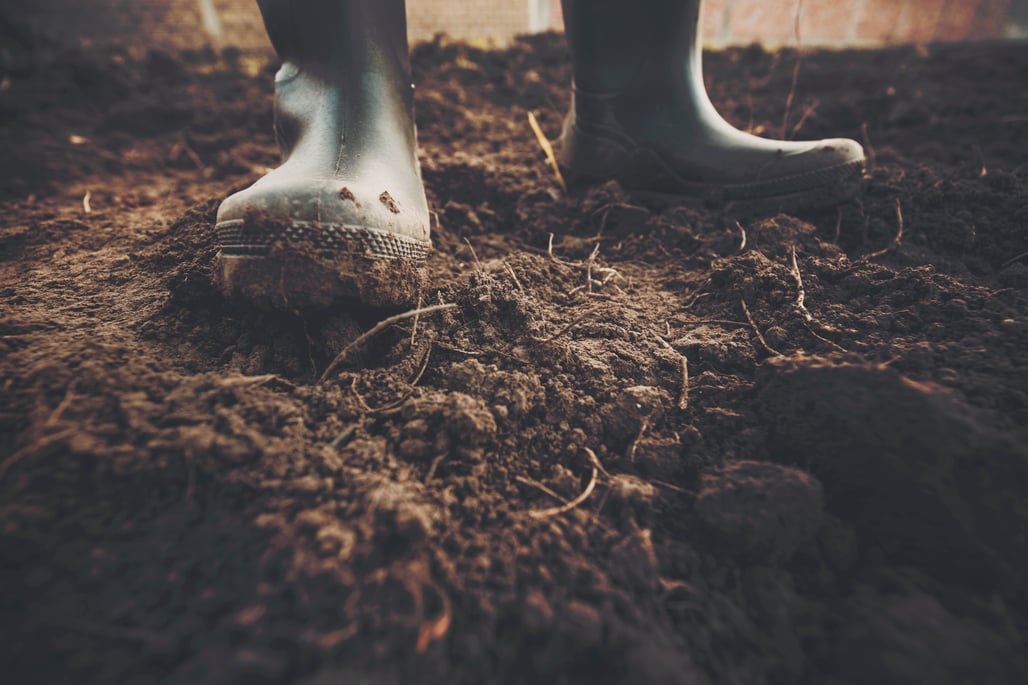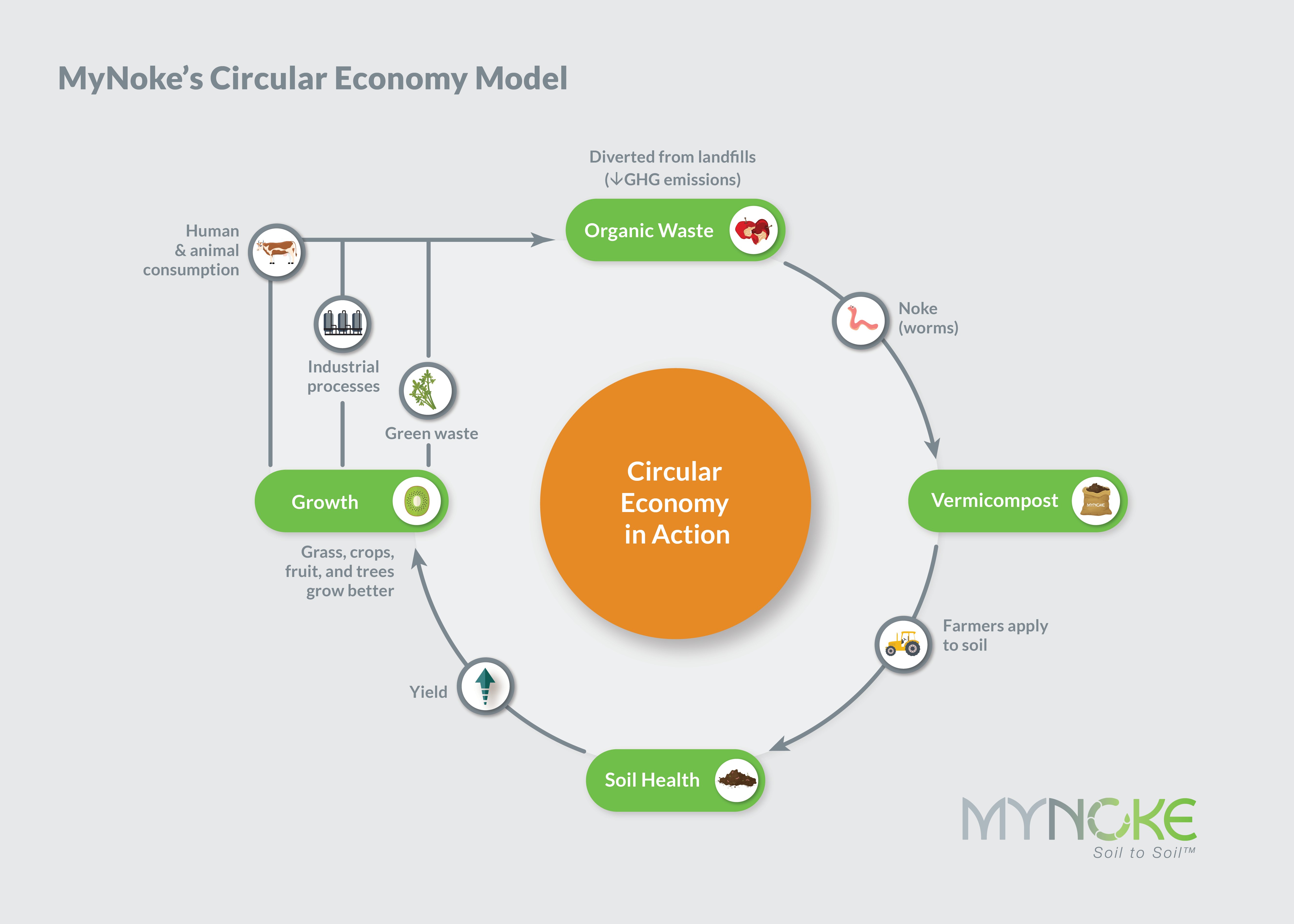
It may not be the first thing that comes to mind when we think of healthy living, but soil health plays a crucial role in our wellbeing and that of our planet. Healthy soils are the foundation of life, as they provide the nutrients that sustain us and support the balance and stability of our ecosystems.
In this article, we mostly discuss fertile and productive soils in the context of food production, highlighting their efficiency for agriculture. However, we must also acknowledge that, beyond traditional human-focused uses, soils that are not used for growing crops support a variety of ecosystems which makes them equally important for the overall health of our environment.
Organic matter matters
Soil is a bustling ecosystem brimming with life and vitality. There are more living organisms in a tablespoon of soil than there are people on this earth. Together with water, soil serves as the lifeblood of our planet. It’s been estimated that 95% of our food is directly or indirectly produced in our soils. Read more here.
Just like we need a balanced diet to thrive, plants need essential nutrients to grow strong and vibrant. Organic matter holds water and the nutrients that support plant growth and healthy roots. It also provides the food and physical spaces for microbial growth which promotes microbial diversity, pathogen suppression and increased soil nutrient cycling.
Watch MyNoke’s founder, Dr Michael Quintern, talk at TEDxTauranga about organic matter and why it is the heart and soul of our soils.
Black soils are rich in organic carbon, with thick, dark-coloured horizons. They are usually used for intensive agriculture due to their very high fertility and considered the food basket of the world. The world’s most fertile areas have been mapped here and can be found in the Russian Federation, Ukraine, and parts of Asia and the Americas.
In New Zealand, the strength of our economy (think farming, forestry and tourism) as well as our people’s health and wellbeing depend on healthy soils. However, New Zealand soils have some specific challenges such as soil degradation, erosion, and intense rainfall. Manaaki Whenua – Landcare Research explains more here.
Global momentum for sustainable soil initiatives
Around the world, concerted efforts to address and improve soil health are growing. There is a noticeable focus on sustainable and environmentally friendly farming techniques, and more education and awareness campaigns are launched to inform farmers, policymakers, and the public about the importance of soil health. Policies to support sustainable soil management practices are also increasingly introduced.
One example is an innovative new research programme that was launched in December 2023 by the Victorian state government in Australia and its dairy sector. The aim is to introduce cutting-edge farming practices that dial down the industry's reliance on synthetic fertilisers and to increase productivity and resilience to climate change challenges.
The circular economy in action
Vermicast products (pure earthworm castings) are recognised as a superfood for gardens, but the concept is relatively new within New Zealand agriculture. MyNoke is at the forefront of the movement, being the first to invest in worm farming at an industrial scale back in 2007.
At MyNoke’s vermicomposting sites in Taupō, Tokoroa, and Ohakune, organic waste such as kitchen scraps and paper, biosolids and sludges from industrial food are turned into vermicast by billions of earthworms. To date, more than 1.4 million tonnes of organic waste has been diverted from landfill.
Food production and waste management are two increasing global issues, and MyNoke’s circular economy approach presents an opportunity to address this double challenge. Organic waste produced from human and animal consumption, industrial processes and green waste is ingested by earthworms, which excrete a valuable, natural soil conditioner known as worm castings or vermicast. When vermicast is applied to the soil to support plant growth, and plants are then harvested and processed, organic waste is again created and the circle continues.
 The essential role of earthworms
The essential role of earthworms
Earthworms are nature's own soil engineers. They aerate the soil as they tunnel through it, improving its structure and allowing roots to penetrate easily. Thanks to earthworms, water, air, and nutrients move more freely, creating an environment where plants can thrive.
Through their digestive system, earthworms transform organic matter into nutrient-packed vermicast. The result is a high-quality natural soil conditioner that provides a well-balanced mix of organic matter, nutrients and microbial activity that promotes healthy plant growth and improves soil fertility. When the soil structure is enhanced, plants thrive and that increases yield.
Pure earthworm castings also contain beneficial microorganisms that act as natural protectors, warding off harmful pests and diseases. It also improves water retention, reduces the risk of topsoil erosion, and increases resistance to climatic stress.
MyNoke’s vermicast is an ideal solution for healthy pastures, horticulture, cropping, landscaping, topsoils, raised garden beds and more. Liquid Vermicast Extract is widely used for irrigation, foliar application, seed inoculation, hydroponic systems and general home garden and indoor plant use.
For a copy of MyNoke's vermicast brochure click here, or contact the team via email info@mynoke.co.nz or https://www.mynoke.co.nz/contact for further information.
The link between organic matter, soil health and vermicast
New Zealand soils have relatively large amounts of organic matter and great organic matter storage capacity. On average, 90 tonnes per hectare of carbon (C) are stored in our soils, which is high by world standards.
When organic matter is present in the soil, it contributes nutrients, improves soil structure, and enhances water retention capacity. Both organic matter and vermicast contribute to improving soil structure, which means that when farmers and horticulturists add vermicast to the land, the soils become even more productive.
When market gardens see a reduction in soil carbon/organic matter over time, the much-needed organic matter can be added back into the soil with vermicast. Rotational grazing and crop rotation can increase organic matter and optimise nutrients in the soil again over time, and vermicast boosts this transition.
With a well-balanced blend of essential nutrients, beneficial microorganisms, and improved soil structure, vermicast can replace organic matter in cases where topsoil has been removed, and it is particularly useful in sandy soils that have low organic matter.
Moreover, incorporating vermicast into the soil promotes sustainable soil management practices. It reduces the reliance on synthetic fertilisers and chemicals, fostering a more environmentally friendly and resilient agricultural system.
What you can do to boost the health of our soils
Improving the health of our soil is a shared responsibility that involves simple yet impactful actions. Here are some practical steps that anyone can take to contribute to soil health:
Composting: Start a compost bin for kitchen scraps and yard waste. Compost enriches soil with valuable nutrients and enhances its structure.
Reduce the use of chemicals: Use organic manures and other organic soil conditioners such as vermicast to promote a more balanced and resilient soil ecosystem.
Crop rotation: If you have a garden, practice crop rotation. This helps prevent soil-borne diseases and pests while promoting nutrient diversity.
Cover cropping: Plant cover crops during the off-season to protect and nourish the soil. These crops help prevent erosion, suppress weeds, and add organic matter when tilled back into the soil.
Water conservation: Use water wisely. Overwatering can lead to soil erosion, nutrient leaching, and the loss of beneficial microorganisms.
Plant native species: Choose native plants for landscaping. Native species are adapted to the local soil conditions, reducing the need for excessive amendments.
Educate yourself and others: Stay informed about sustainable gardening practices. Attend workshops, read books, or join community gardening groups to learn and share knowledge about soil health.
Support regenerative agriculture: Choose products from farms that practice regenerative agriculture. They use methods that focus on restoring and improving soil health while promoting sustainable farming.
Be a soil health advocate: Raise awareness about the importance of soil health within your local community. Real change begins at grassroots level so encourage local initiatives and policies that promote sustainable practises.
By incorporating these simple but effective steps into our daily lives, we can collectively contribute to the health and vitality of the soil, ensuring its resilience for future generations.
To celebrate World Soil Day on 5 December, the Food and Agriculture Organization of the United Nations shared this video to reflect on the profound impact of soil and water on our lives and ecosystems. It’s well worth a watch.
Your questions are welcome
Please don’t hesitate to contact the team if you have any questions or would like to know more. Call 0800 MYNOKE or email info@mynoke.co.nz to find out more about how you can improve the health of your soils with MyNoke’s range of earthworm products.
